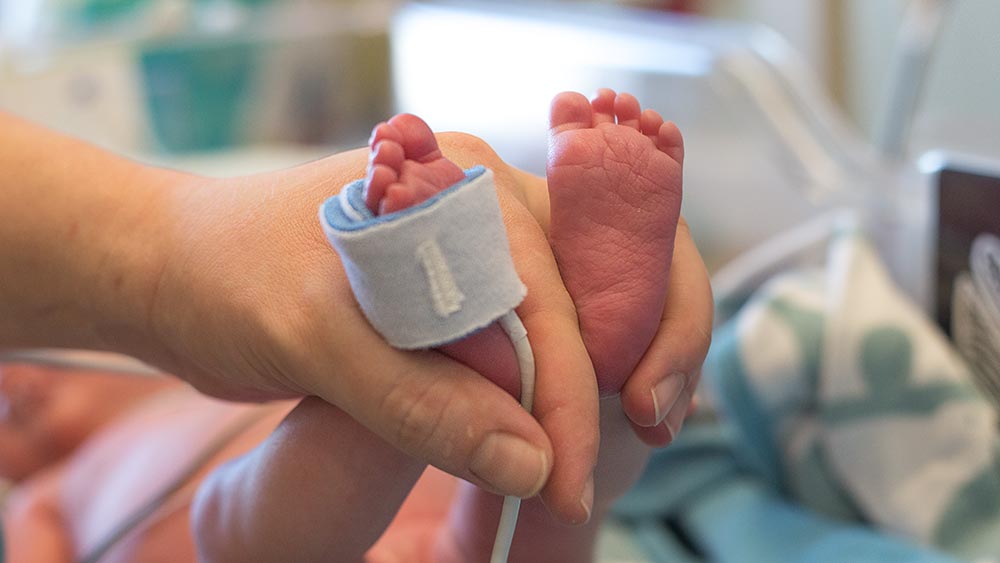Educating Patients in the NICU: Effective Communication with Families in Crisis
Quote from Jessa VonFeldt on November 29, 2022, 9:44 amWritten by Rebecca Miller, BA, LPN, Content Writer at InJoy Health Education
In honor of Prematurity Awareness Month, InJoy is publishing 2 blogs. This blog provides tips for effective communication for families in crisis. The other blog is a personal story of one woman’s NICU experience. Click here to read the previously published blog.
______________________________________________________
As an after-hours hospice crisis nurse, I've had some difficult conversations with my patients. Onboarding to hospice care can be highly traumatic. When a person is faced with such trauma, they shut down and can't absorb the information they are being provided with.
When I'd go out on calls, emotions were high. I found myself repeating instructions several times, writing things down, making sure they felt supported, and following up with a phone call to ensure everything was alright.
NICU nurses share a similar dynamic with hospice with families in crisis, and there is a lot of fear. Death is one of the potential outcomes or disability, and the babies are so fragile it seems like everything is bigger, louder, and more overwhelming.
Nurses want to ensure our families feel supported and build trust. While hospice and NICU are obviously different, we share trauma-informed care as one of our objectives.
In honor of Prematurity Awareness Month, I'd like to share some practical communication skills from hospice/palliative care.
Take time to listen—really listen. Let the parent speak and try not to interrupt, anticipate their answer, or change the subject. You can try the ask-tell-ask method:
- Ask open-ended questions like "Tell me what you know about XYZ intervention for your baby." That way, you can gauge how much the parent has absorbed from the previous contact.
- Tell them more information and what is going to happen next.
- Finally, ask—how can I help? What else can I do? Leave them feeling empowered and listened to.Being a good listener will build rapport with your families and provide a safe space for them. Most importantly, be HONEST. If you don’t know the answer, say so and find out the answer. Make sure you follow through with your promise. It helps build trust, which is essential when working with people in crisis.
It's painful to introduce difficult news, especially if there is a change of condition. Try this:
- First, build trust by firing a "warning shot:" I regret having some difficult news to share with you."
- Then, let them emote. Hold space and be supportive.
- Legitimize the normalcy of the situation and dive into their fears a bit. Ask them what is worrying them the most?
- Be empathetic.
- And, if appropriate, provide hope. As practitioners, we try to avoid giving false hope, but our patients/parents need to find meaning to cope. Keep them involved and informed.
- Expect conflict. Hard news can equal high emotion.
- Finally, close the communication loop by verifying that your message has been heard by having the family restate their understanding.Keep an eye out for non-verbal communication cues you might be sending or receiving, such as crossing arms or fidgeting. Crossing arms might signal that you are defensive and shut down communication. Keep posture that signals you are open to listen like leaning forward and taking notes by hand versus using your phone or tablet. Don’t fidget, if possible. Tapping fingers, picking nails, wringing hands—all are ways to self-soothe, but keep it discrete. Observing these behaviors in those you are counseling may signal the person feels threatened or nervous. Pause and check in with them. Remember, this is a stressful time and things might need repeating.
Face it. We’ve all done it. We’ve said the wrong thing or come across as insensitive. Emotionally charged situations can leave even the most veteran nurse gob smacked. Practicing de-escalation skills with compassionate education will help when things get tough. Ask a coworker to practice with you and provide feedback.
Over the years, I've found that communication strategies come to nurses naturally—we are all curious empaths, asking questions, and making sure people are feeling safe and supported. Still, it's always good to learn a new technique from other nurses. Think about what works best for you and be sure to share your wisdom to the new and student nurses in your unit. You can do this as part of a debrief after handling a difficult situation or schedule a group training session.
Don’t forget. The most important communication is what you say to yourself. Be kind with your words. It’s tempting to beat ourselves up, especially after a hard day. Give yourself a break and decompress. Find solace within your tribe, best friend, family, or furry friend.
With that, InJoy Health Education extends a sincere thank you for all you do for your babies and families.
Thanks for all you do, NICU nurses!
____________________________________
Works Cited
“Principles for Effective Support - What Is Trauma-Informed Care?” What Is Trauma-Informed Care? - Principles for Effective Support, New South Wales Government Mental Health Branch, 17 Aug. 2022, https://www.health.nsw.gov.au/mentalhealth/psychosocial/principles/Pages/trauma-informed.aspx.
Mazanec, Polly. “Communication Tips for Nurses Supporting Seriously Ill Patients ...” Sigma Repository, Sigma Theta Tau International, 6 Mar. 2020, https://sigma.nursingrepository.org/bitstream/handle/10755/20416/Slides.pdf?sequence=1.
InJoy offers NICU patient education materials to help you provide compassionate education, including video stories: Click here to learn more about the NICU education curriculum.
InJoy also offers materials on perinatal bereavement to help parents cope with unexpected infant loss. Click here to learn more.
Rebecca Miller, BA, LPN, is a Content Writer at InJoy. She served as an after-hours hospice nurse from 2016-2022, working with adults and pediatric patients. Rebecca has written for several newspapers, magazines, and online publications. She is the author of Being Max’s Mom, The Whisper and is currently working on her new book, Dead People Stuff.
Written by Rebecca Miller, BA, LPN, Content Writer at InJoy Health Education
In honor of Prematurity Awareness Month, InJoy is publishing 2 blogs. This blog provides tips for effective communication for families in crisis. The other blog is a personal story of one woman’s NICU experience. Click here to read the previously published blog.
______________________________________________________
As an after-hours hospice crisis nurse, I've had some difficult conversations with my patients. Onboarding to hospice care can be highly traumatic. When a person is faced with such trauma, they shut down and can't absorb the information they are being provided with.
When I'd go out on calls, emotions were high. I found myself repeating instructions several times, writing things down, making sure they felt supported, and following up with a phone call to ensure everything was alright.
NICU nurses share a similar dynamic with hospice with families in crisis, and there is a lot of fear. Death is one of the potential outcomes or disability, and the babies are so fragile it seems like everything is bigger, louder, and more overwhelming.
Nurses want to ensure our families feel supported and build trust. While hospice and NICU are obviously different, we share trauma-informed care as one of our objectives.

In honor of Prematurity Awareness Month, I'd like to share some practical communication skills from hospice/palliative care.
Take time to listen—really listen. Let the parent speak and try not to interrupt, anticipate their answer, or change the subject. You can try the ask-tell-ask method:
- Ask open-ended questions like "Tell me what you know about XYZ intervention for your baby." That way, you can gauge how much the parent has absorbed from the previous contact.
- Tell them more information and what is going to happen next.
- Finally, ask—how can I help? What else can I do? Leave them feeling empowered and listened to.
Being a good listener will build rapport with your families and provide a safe space for them. Most importantly, be HONEST. If you don’t know the answer, say so and find out the answer. Make sure you follow through with your promise. It helps build trust, which is essential when working with people in crisis.
It's painful to introduce difficult news, especially if there is a change of condition. Try this:
- First, build trust by firing a "warning shot:" I regret having some difficult news to share with you."
- Then, let them emote. Hold space and be supportive.
- Legitimize the normalcy of the situation and dive into their fears a bit. Ask them what is worrying them the most?
- Be empathetic.
- And, if appropriate, provide hope. As practitioners, we try to avoid giving false hope, but our patients/parents need to find meaning to cope. Keep them involved and informed.
- Expect conflict. Hard news can equal high emotion.
- Finally, close the communication loop by verifying that your message has been heard by having the family restate their understanding.
Keep an eye out for non-verbal communication cues you might be sending or receiving, such as crossing arms or fidgeting. Crossing arms might signal that you are defensive and shut down communication. Keep posture that signals you are open to listen like leaning forward and taking notes by hand versus using your phone or tablet. Don’t fidget, if possible. Tapping fingers, picking nails, wringing hands—all are ways to self-soothe, but keep it discrete. Observing these behaviors in those you are counseling may signal the person feels threatened or nervous. Pause and check in with them. Remember, this is a stressful time and things might need repeating.
Face it. We’ve all done it. We’ve said the wrong thing or come across as insensitive. Emotionally charged situations can leave even the most veteran nurse gob smacked. Practicing de-escalation skills with compassionate education will help when things get tough. Ask a coworker to practice with you and provide feedback.
Over the years, I've found that communication strategies come to nurses naturally—we are all curious empaths, asking questions, and making sure people are feeling safe and supported. Still, it's always good to learn a new technique from other nurses. Think about what works best for you and be sure to share your wisdom to the new and student nurses in your unit. You can do this as part of a debrief after handling a difficult situation or schedule a group training session.
Don’t forget. The most important communication is what you say to yourself. Be kind with your words. It’s tempting to beat ourselves up, especially after a hard day. Give yourself a break and decompress. Find solace within your tribe, best friend, family, or furry friend.
With that, InJoy Health Education extends a sincere thank you for all you do for your babies and families.
Thanks for all you do, NICU nurses!
____________________________________
Works Cited
“Principles for Effective Support - What Is Trauma-Informed Care?” What Is Trauma-Informed Care? - Principles for Effective Support, New South Wales Government Mental Health Branch, 17 Aug. 2022, https://www.health.nsw.gov.au/mentalhealth/psychosocial/principles/Pages/trauma-informed.aspx.
Mazanec, Polly. “Communication Tips for Nurses Supporting Seriously Ill Patients ...” Sigma Repository, Sigma Theta Tau International, 6 Mar. 2020, https://sigma.nursingrepository.org/bitstream/handle/10755/20416/Slides.pdf?sequence=1.
InJoy offers NICU patient education materials to help you provide compassionate education, including video stories: Click here to learn more about the NICU education curriculum.
InJoy also offers materials on perinatal bereavement to help parents cope with unexpected infant loss. Click here to learn more.
 Rebecca Miller, BA, LPN, is a Content Writer at InJoy. She served as an after-hours hospice nurse from 2016-2022, working with adults and pediatric patients. Rebecca has written for several newspapers, magazines, and online publications. She is the author of Being Max’s Mom, The Whisper and is currently working on her new book, Dead People Stuff.
Rebecca Miller, BA, LPN, is a Content Writer at InJoy. She served as an after-hours hospice nurse from 2016-2022, working with adults and pediatric patients. Rebecca has written for several newspapers, magazines, and online publications. She is the author of Being Max’s Mom, The Whisper and is currently working on her new book, Dead People Stuff.











